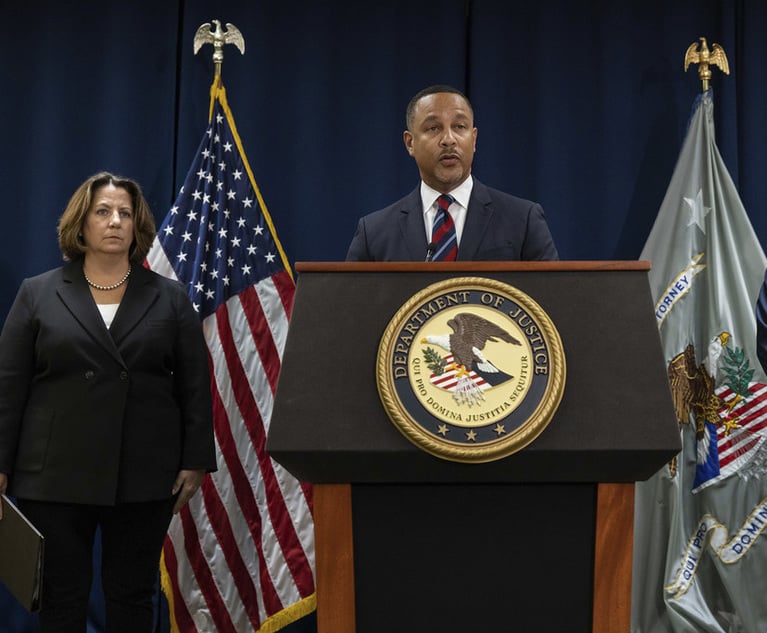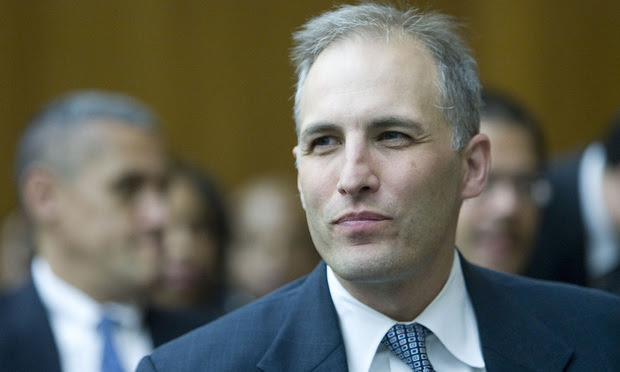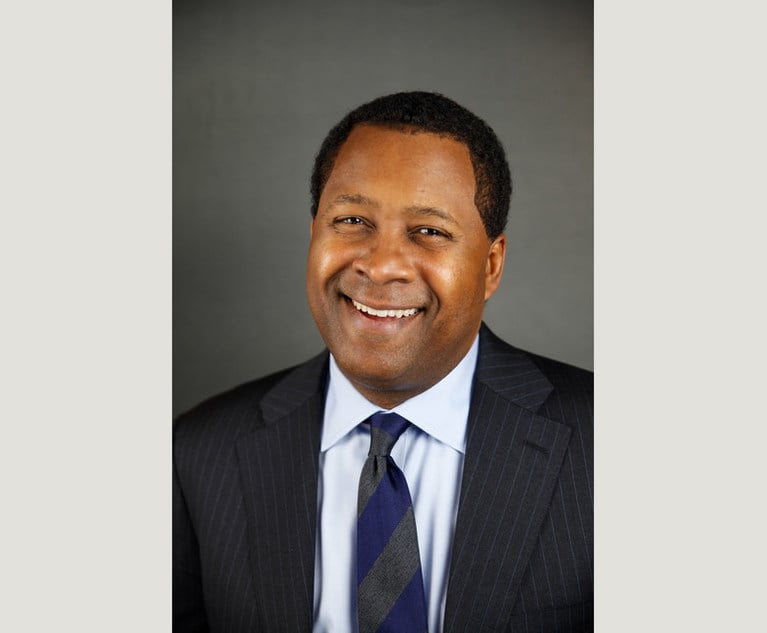Compliance Hot Spots: Watching This Lawyer-Whistleblower Case | Tesla's Troublesome Tweets | Meet Uber's New Chief Security Officer
An ex-Morgan Stanley lawyer alleges retaliation after raising FCPA and securities claims. Why we are watching this case and you should, too. Plus: Uber snags ex-DOJ and NSA lawyer Matt Olsen for a top security post. And scroll down for more on Tesla's law firm engagements.
August 14, 2018 at 09:00 PM
9 minute read
Welcome to Compliance Hot Spots, our briefing on compliance, enforcement and government affairs. Lot to unpack this week—but first want to put a lawyer-whistleblower's case on your radars. We're always hunting for compliance litigation. Here's something: a former top in-house lawyer at Morgan Stanley claims he was pushed out after raising FCPA and securities concerns.
As always thanks for reading—and please do send feedback. I appreciate hearing from you about what's on your plate—observations, trends, new clients. I'm at [email protected] and 202-828-0315, or follow me on Twitter @cryanbarber.
➤➤ Would you like to receive Compliance Hot Spots as a weekly email? Sign up here.
Ex-Morgan Stanley Lawyer Claims Retaliation
After nearly a decade as an in-house lawyer at Morgan Stanley, Christopher Garvey's eyes were set on moving up the ranks. Until he was pushed out in 2016—according to a whistleblower complaint he filed at the U.S. Labor Department. Garvey alleges he was forced to resign after raising concerns about possible violations of U.S. anti-bribery laws and securities regulations.
Morgan Stanley's lawyers at Morgan, Lewis & Bockius—Sarah Bouchard, co-leader of the firm's whistleblower group, is chief counsel—contend Garvey voluntarily resigned while he was looking for employment elsewhere. Garvey last year started the Europe-based litigation funding firm Sachenga & Co. The bank “strongly denies” Garvey's claims of an alleged cover-up involving alleged U.S. law violations.
Garvey declined to speak with me about his case, which I recently wrote about in The National Law Journal. There's a lot going on in this case—and the fight will last for many more months. We'll stay tuned.
➤➤ Garvey has named names. He said Eric Grossman, Morgan Stanley's chief legal officer, “reacted angrily and abruptly” to the preliminary conclusions issued by an outside firm hired to investigate claims involving one of the bank's consultants in India. Grossman, according to Garvey, fired the firm, which is not identified in the records, and then hired another legal team to continue the investigation.
➤➤ Novel legal issues have already come up. Let's talk about litigation funding. As a former in-house lawyer, Garvey said he has confidential documents that he wanted to share with litigation funders who might help finance his case. Morgan Stanley successfully argued that Garvey should be blocked from sharing privileged information. The dispute forced Larry Merck, the presiding Labor Department judge, to address a novel legal issue: whether Garvey was entitled to share privileged information with outside funders. Merck said he couldn't find any cases on point. He ruled against Garvey. But the judge—ruling against Morgan Stanley—said Garvey, on his own, still could use privileged information in his case.
➤➤ What's on the horizon: The lawyers in the case—Garvey represents himself—are in the early stages of discovery. It's unclear what evidence will be presented, and who the witnesses might be. There likely won't be any major hearing until at least early next year. Merck earlier this year declined an initial push from Morgan Stanley to dismiss Garvey's claims.
In case you missed it: Bloomberg's got a report on a former managing director suing Goldman Sachs. The firms Redniss LLC and Press Koral LLP filed the complaint. Plus: a team from Goodwin Procter looks at DOJ's position on FCPA successor liability.
Compliance Reading: CFIUS Reform & Dealmakers; SEC's Busy SF Docket
>> U.S. companies dealing with foreign investors now have a new reality to contend with after Trump signed legislation Monday that expands the jurisdiction of the Committee on Foreign Investment in the United States, my colleague MP McQueen writes. Michael Leiter, national security and CFIUS partner at Skadden, Arps, Slate, Meagher & Flom, says the expansion of covered transactions “really does shape the way transactions of all sorts will have to be structured going forward.”
>> Tesla. Theranos. Yahoo! Inc. As tech companies have grown, so too has the scale of their alleged scandals. For Wall Street's top regulator, the Securities and Exchange Commission, that means the office across the country in San Francisco is staying plenty busy. Bloomberg reports that SEC enforcement attorneys in the Bay Area were already asking questions of Tesla when its flashy CEO, Elon Musk, jolted the electric car maker's stock price with the tweet heard round the world, claiming he'd secured financing to take the company private—without offering evidence to back it up.
>> A speed bump. Investment Technology Group Inc. can say that again. For the third time in three years, the New York-based brokerage is being fined by the SEC. This time, it's for introducing a speed bump for high frequency traders—similar to what drew the best-selling author Michael Lewis' attention in the book “Flash Boys”— without giving proper disclosures. As Bloomberg reports, “doing things without telling clients isn't allowed by the SEC.”
>> Worried that the federal government might crimp their style, states are claiming their territory with the regulation of financial technology startups. The Trump administration has been making moves to embrace financial technology startups, but states worry that those efforts could undermine their own efforts to shape the market to the benefit of their citizens. “One worry,” the Wall Street Journal reports, “is that federal financial agencies will override state usury laws against excessive interest rates.”
>> In the land down under, Australian lawmakers have proposed a new law that would require technology firms such as Google, Facebook and Apple to give police access to private encrypted data linked to suspected illegal activities. The proposal calls for fines of up to A$10 million (that's $7.3 million in U.S. dollars) for companies that don't comply. Reuters reports that cybersecurity experts are “worried about a lack of judicial oversight, saying the policy was out of step with privacy laws elsewhere.” Australia's proposal, the Financial Times reports, is “part of a trend that has seen the UK, US and other authorities introduce laws to help police access user data to tackle serious crime, terrorism and national security issues.”
>> The U.S. Court of Appeals for the Third Circuit isn't letting JPMorgan & Co. sidestep the Financial Industry Regulatory Authority's arbitration process, according to my colleagues at The Legal Intelligencer. In a recent ruling, the Third Circuit said JPMorgan can't use a forum-selection clause to avoid its obligation as a FINRA member to arbitrate claims brought by a disgruntled client. And so, we have a circuit split on our hands: the Second and Ninth circuits, under similar circumstances, have upheld forum selection clauses as arbitration waivers.
Who Got the Work: Tesla & Musk Edition
Tesla was hit last week with a federal securities class action in California. “Defendants embarked on a scheme and course of conduct to artificially manipulate the price of Tesla stock to completely decimate the Company's short-sellers (and, on the way, injured all purchasers of Tesla securities).
This started with a Musk Tweet at 12:48 p.m. on August 7 stating: “Am considering taking Tesla private at $420. Funding secured.” Chicago-based Keller Lenkner LLC and a team from Browne George Ross LLP in Los Angeles filed the complaint Aug. 10 in the Northern District of California. Reuters has more here.
Tesla, meanwhile, says it has teamed with the firms Wachtell, Lipton, Rosen & Katz and Munger, Tolles & Olson on a proposal to take the company private.
➤➤ More reading: Lessons from Elon Musk: What the CEO's Tweet Can Teach GCs About Damage Control
On the Move: New Hires and Promotions
>> Matthew Olsen, a former general counsel to the National Security Agency and top prosecutor in Washington's U.S. attorney office, was named Uber's chief security officer. Olsen (above) previously was picked to help the company “think through how best to guide and structure out security teams.” Olsen's legal career in Washington has included several top posts at the Justice Department and within intelligence agencies. The New York Times has more here.
>> King & Spalding snagged G. Patrick Montgomery away from Kirkland & Ellis to join the Atlanta-based firm's rapidly expanding special matters and government investigations team. From my colleague Ryan Lovelace in The National Law Journal: “Montgomery's addition bolsters the Washington lineup on the special matters team, which added former acting U.S. Attorney General Sally Yates in May. The group has grown by five partners this year—including Montgomery and Yates—in Atlanta, Chicago, D.C. and London.”
>> Citigroup has picked Anand Selva, a 26-year veteran of the bank, to fill a newly created position called head of U.S. consumer banking. The move comes as Citigroup tries to break down walls between its various U.S. teams and adopt a more seamless approach similar to how the bank already operates in Asia and Mexico. From the Wall Street Journal: “In his new role, Mr. Selva must get retail banking, wealth products and Citigroup-branded cards groups to go to market with a broader focus on the bank's services, or the “full Citi relationship.”
Got a new move in the compliance, white-collar and regulatory space? Shoot me a note at [email protected].
This content has been archived. It is available through our partners, LexisNexis® and Bloomberg Law.
To view this content, please continue to their sites.
Not a Lexis Subscriber?
Subscribe Now
Not a Bloomberg Law Subscriber?
Subscribe Now
NOT FOR REPRINT
© 2025 ALM Global, LLC, All Rights Reserved. Request academic re-use from www.copyright.com. All other uses, submit a request to [email protected]. For more information visit Asset & Logo Licensing.
You Might Like
View All
Compliance Hot Spots: GOP Eyes ESG as an Antitrust Issue + Another DOJ Crypto Seizure + Sidley Partner Jumps to Main Justice
9 minute read
Compliance Hot Spots: Lessons from Lafarge + Fraud Section Chief Talks Compliance + Cravath Lands FTC Commissioner
11 minute readTrending Stories
- 1Buyer Beware:Continuity of Coverage in Legal Malpractice Insurance
- 2‘Listen, Listen, Listen’: Some Practice Tips From Judges in the Oakland Federal Courthouse
- 3BCLP Joins Saudi Legal Market with Plans to Open Two Offices
- 4White & Case Crosses $4M in PEP, $3B in Revenue in 'Breakthrough Year'
- 5Thursday Newspaper
Who Got The Work
J. Brugh Lower of Gibbons has entered an appearance for industrial equipment supplier Devco Corporation in a pending trademark infringement lawsuit. The suit, accusing the defendant of selling knock-off Graco products, was filed Dec. 18 in New Jersey District Court by Rivkin Radler on behalf of Graco Inc. and Graco Minnesota. The case, assigned to U.S. District Judge Zahid N. Quraishi, is 3:24-cv-11294, Graco Inc. et al v. Devco Corporation.
Who Got The Work
Rebecca Maller-Stein and Kent A. Yalowitz of Arnold & Porter Kaye Scholer have entered their appearances for Hanaco Venture Capital and its executives, Lior Prosor and David Frankel, in a pending securities lawsuit. The action, filed on Dec. 24 in New York Southern District Court by Zell, Aron & Co. on behalf of Goldeneye Advisors, accuses the defendants of negligently and fraudulently managing the plaintiff's $1 million investment. The case, assigned to U.S. District Judge Vernon S. Broderick, is 1:24-cv-09918, Goldeneye Advisors, LLC v. Hanaco Venture Capital, Ltd. et al.
Who Got The Work
Attorneys from A&O Shearman has stepped in as defense counsel for Toronto-Dominion Bank and other defendants in a pending securities class action. The suit, filed Dec. 11 in New York Southern District Court by Bleichmar Fonti & Auld, accuses the defendants of concealing the bank's 'pervasive' deficiencies in regards to its compliance with the Bank Secrecy Act and the quality of its anti-money laundering controls. The case, assigned to U.S. District Judge Arun Subramanian, is 1:24-cv-09445, Gonzalez v. The Toronto-Dominion Bank et al.
Who Got The Work
Crown Castle International, a Pennsylvania company providing shared communications infrastructure, has turned to Luke D. Wolf of Gordon Rees Scully Mansukhani to fend off a pending breach-of-contract lawsuit. The court action, filed Nov. 25 in Michigan Eastern District Court by Hooper Hathaway PC on behalf of The Town Residences LLC, accuses Crown Castle of failing to transfer approximately $30,000 in utility payments from T-Mobile in breach of a roof-top lease and assignment agreement. The case, assigned to U.S. District Judge Susan K. Declercq, is 2:24-cv-13131, The Town Residences LLC v. T-Mobile US, Inc. et al.
Who Got The Work
Wilfred P. Coronato and Daniel M. Schwartz of McCarter & English have stepped in as defense counsel to Electrolux Home Products Inc. in a pending product liability lawsuit. The court action, filed Nov. 26 in New York Eastern District Court by Poulos Lopiccolo PC and Nagel Rice LLP on behalf of David Stern, alleges that the defendant's refrigerators’ drawers and shelving repeatedly break and fall apart within months after purchase. The case, assigned to U.S. District Judge Joan M. Azrack, is 2:24-cv-08204, Stern v. Electrolux Home Products, Inc.
Featured Firms
Law Offices of Gary Martin Hays & Associates, P.C.
(470) 294-1674
Law Offices of Mark E. Salomone
(857) 444-6468
Smith & Hassler
(713) 739-1250














